Movie Review – Alien
Seminal sci-fi picture from director Ridley Scott, Alien remains one of the most frightening, enduring and magnificent entries into the genres long history. Well shot, beautifully crafted for maximum impact, there’s very few films today that can outmatch Alien for sheer heart-pounding terror. Except perhaps its sequel.
– Summary –
Director : Ridley Scott
Year Of Release : 1979
Principal Cast : Tom Skerrit, Ian Holm, Sigourney Weaver, John Hurt, Yaphet Kotto, Veronica Cartright, Harry Dean Stanton.
Awards : Academy Award (Best Visual Effects), Saturn Awards (Best Film, Best Director, Best Supporting Actress-Veronica Cartright)
Approx Running Time : 119 Minutes
Synopsis: After landing on an alien world to answer a distress call, the crew of the mining vessel Nostromo discover they’ve accidentally brought a new life-form on board that threatens their very existence.
What we think : Seminal sci-fi picture from director Ridley Scott, Alien remains one of the most frightening, enduring and magnificent entries into the genres long history. Well shot, beautifully crafted for maximum impact, there’s very few films today that can outmatch Alien for sheer heart-pounding terror. Except perhaps its sequel.
**********************
If you were to count down the most influential science fictions films made over the last half century, somewhere towards the top of that list would be a couple of Ridley Scott films, namely Blade Runner and Alien. Scott almost single-handedly revolutionized hard sci-fi during the period between 1979 and 85, kicking things off with the noirish, gritty space thriller, Alien. Little did he realise at the time just what he was unleashing upon cinema audiences, with the Alien saga ballooning into a major franchise for 20th Century Fox. The edgy, non-politically correct nature of Alien, with it’s realistic narrative and believable look into future tech, caused a minor sensation with audiences upon its release to audiences in 1979. Sparing use of the film’s main villain, coupled with a brooding, atmospheric tone, and believable characters, gave audiences a real jolt of adrenaline, effectively introducing one of cinema’s greatest screen villains. It also introduced one of cinema’s great female screen icons, Ellen Ripley; a character which would even have Sigourney Weaver nominated for an Oscar in the role in the mega-sequel, Aliens.
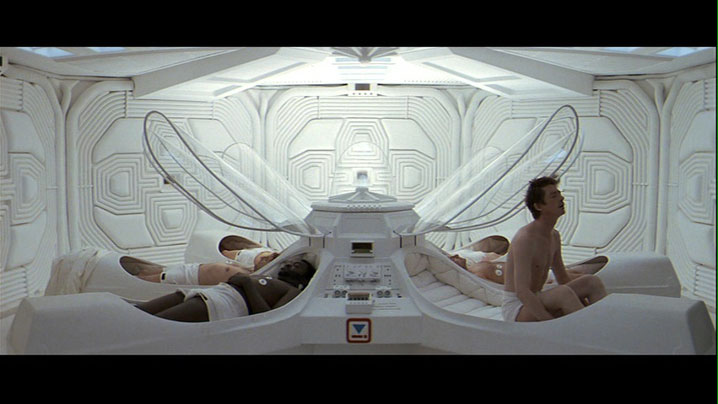
This review focuses on the original theatrical version of Alien. In 2003, Ridley Scott re-edited the film for the DVD Quadrilogy release by 20th Century Fox; this “Director’s Cut” contains some alternate footage, and an adjusted running time. The Director’s Cut will be reviewed here at a later date.
Alien, a low-key thriller set on a giant mining ship floating through space, is the story of a group of lower-class miners battling a vicious, indestructible alien creature. The film begins with the Nostromo, the enormous mining vessel, on it’s return home to Earth; we find the occupants are currently in stasis for the journey, until they’re awoken by the computer in response to a distress beacon. Initially hesitant to render assistance, due mainly to the fact that they’re not a rescue ship, with limited medical facilities, and they’re way out of their specified course to home, eventually the captain decides to help out. They land a drop-ship on the planet the distress beacon originates, and discover a crash-landed alien craft. Investigating further, the team of explorers encounter a collection of egg-like entities, one of which opens and attacks one of the crew. Upon return to the Nostromo, the crew member shows no sign of his assault by the tiny alien creature, however, during a later meal, another creature bursts from his chest and he dies. Tension mounts as the alien creature hides in the bowels of the massive ship, gradually attacking (and killing) each member of the crew until only a few are left.
Let’s not beat about the bush: Alien riffs on numerous other “Ten Little Indian” styled narratives, especially with the increasing body count, yet remains a relatively unique film experience. Ridley Scott used a gritty, urban styled production value on this film, making the most of the shadows and dark corners of the Nostromo’s cavernous interior. Often, it’s what we can’t see that makes the most effective thrills. Where Alien succeeds is in its atmospheric take on “realistic” science fiction, a believable world that could occur in the far future, an anti-Buck Rogers aesthetic that kicked off in the mainstream with Star Wars a few years earlier: grim , gritty and earthy. Characters swear and curse, commit acts of violence and bicker about money, much like they do today. The cast are uniformly excellent, led by big-names Tom Skerrit and Ian Holm. Skerrit plays the captain of the Nostromo, Dallas, who leads his crew as best he can while knowing that they’re completely screwed. Holm, meanwhile, has the pivotal role of the ships science officer, who turns out to be an android with a mission to protect the alien creature so it can be returned to Earth. Yaphet Kotto, John Hurt, Veronica Cartwright and Harry Dean Stanton make up the rest of the crew, alongside Sigourney Weaver, the strong willed (yet outranked) operations officer.
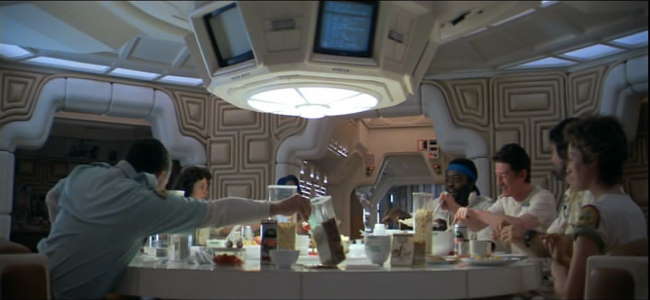
Alien‘s success can, I think, be traced to two key elements Ridley Scott gave the film. The first was its dark and dingy production design; the Nostromo isn’t a brightly lit Star Trek style spacecraft. It’s dank and dangerous, an industrial maze of corridors, access tunnels and dark corners. Perfect hiding places for a fast, vicious alien being intent on killing the human occupants for food. Scott’s use of moody, atmospheric lighting and intense dark shadows, unlit by anything except the torches used by the Nostromo crew, makes for a tense, frightening stage for action.The second aspect which gives Alien its impact is the fact that Scott never reveals the full alien creature to us. Instead, we catch glimpses, flashes and slip-second bursts of the creature, a confusing tangle of arms, legs and teeth. The added darkness of the Nostromo keeps the alien hidden, which only serves to heighten our fear (the fear of the unknown), by never giving us the full picture. It’s clever film-making, and has since been much copied.
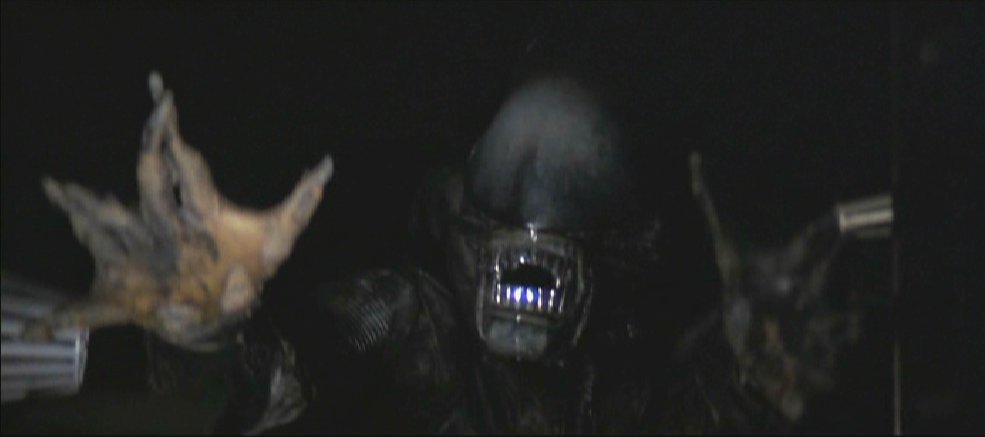
The casting, and the subsequent performances of the cast, only add to the realism of the film. While most certainly in the realm of science fiction, Alien manages to deliver a realistic world, an identifiable set of characters with sharply drawn personalities, which we can empathize with, if not wholeheartedly support. While essentially the quintessential stock characters of a film of this type, each one has enough variation and depth to seem fresh and new: the brash, cocky upstart, the mumbling janitor type, the scared, about-to-break-down nervous one, and even the quiet, thinking-man scientist. Skerritt, given leading man status due to being a bigger star at the time the film was made, gives a solid performance. Ian Holm, whose role is pivotal to the franchise as a whole, as the ships science officer who has a hidden agenda (and a hidden past!), is equally solid, his performance slightly creepy and off-centre as required. John Hurt’s iconic portrayal as the first victim of the alien attack (which was parodied to perfection by Mel Brooks in Spaceballs!) is a typical wide-eyed explorer type: Hurt’s done better both before and after, but his role here doesn’t allow much room to grow. Veronica Cartright, who many viewers will remember from her turn as Rod Taylor’s sister in Hitchcocks The Birds, plays Lambert, the ships navigator. As the most emotionally unstable of the crew, she is the first to flip out as the alien menace becomes larger. Cartright’s performance is pitch perfect, a mix of irritating “grow some balls woman!” timidity and genuine terror once she’s in dire peril. Stanton and Kotto, as the ships janitorial/maintenance crew, are the interpersonal antagonists of the film, generating the schisms between the crew’s ability to function as a single unit in the face of imminent doom.
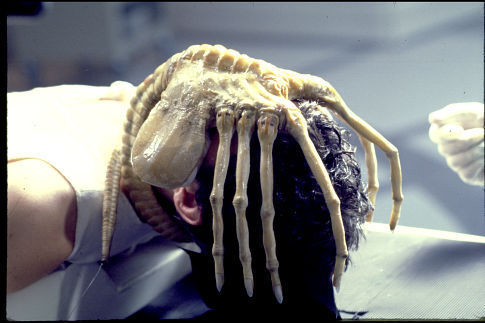
But the real star of the film, who comes into her own as the film gets closer to its terrifying climax, is Sigourney Weaver. Ripley is tough, uncompromising, and loyal; although sometimes this attitude puts her offside with the rest of the crew. When the film opens, Ripley doesn’t immediately strike you as the heroine of the film; she drifts through the film in perfect symmetry with the rest of the cast. It’s only as the human numbers begin to dwindle that she comes into her own, her rising panic and desperation to survive carrying her into emotional realms until now unseen by her character. While Ripley’s tough-talking attitude makes her initially seem a bit of a bitch, by the end of the film you realize that had she been listened to, things may have turned out differently. Weaver isn’t the glamorous heroine Hollywood usually throws up: Ripley isn’t a supermodel sci-fi chick, she’s a working girl (in the non-prostitute sense of the word, obviously) who takes no crap.
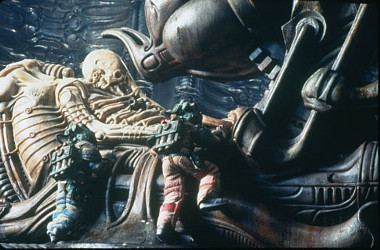
Scott directs Alien with an eye for detail, the small details that perhaps go unnoticed on first viewing. The nuances in the characters, the set design and its integration into the story, the technology on display here; everything you see is designed to heighten the fear and terror in the viewer. One of the more interesting aspects of this film (at least, interesting for me) is the editing, which verges on the almost amateur at times. It’s not amateur, by any stretch, but editor Terry Rawlings uses the fractured mid-shot cuts to great effect. What are you on about, you ask. Rawlings has done something with the film here that enhances the action: often, he intercuts between two shots/takes that are in the middle of motion, thereby highlighting the action and giving the audience the feeling that the raw, documentary-esque camerawork is indeed just that. It’s a realism and shock-tactic that’s come to be utilized more and more in the years since, but my personal belief is that Rawlings mastered it here with Alien. Take, for example, the famous chest-bursting sequence, with John Hurt writing in agony as the baby alien emerges from his body. The intercutting of the shocked crew-members, with the bloody carnage of a convulsing Hurt, is both jarring and effective. Or the final sequence with the adult alien emerging from the piping of the Nostromo’s escape pod, in which Ripley is hoping to return to earth. Heart-pounding terror from Weaver, alongside the horror of the alien form, is raggedly intercut to produce a highly charged, terrifying scene.
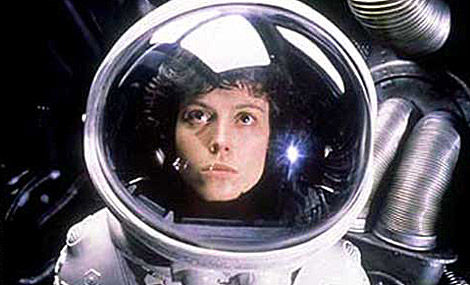
Alongside the editing, I must mention the evocative score from composer Jerry Goldsmith. It’s a score which would go on to define the franchise, echoes of which would come back in James Horner’s Aliens score, and even Eliott Goldenthal’s version in Alien 3. In my mind, Goldsmith’s score brings me into outer space, a melancholy, often lonely score emphasizing just how distant the Nostromo is from any other human contact. Of course, the more “thrilling” moments of the score, where the action heats up, is equally as effective, a dark and foreboding accompaniment to the events on screen.
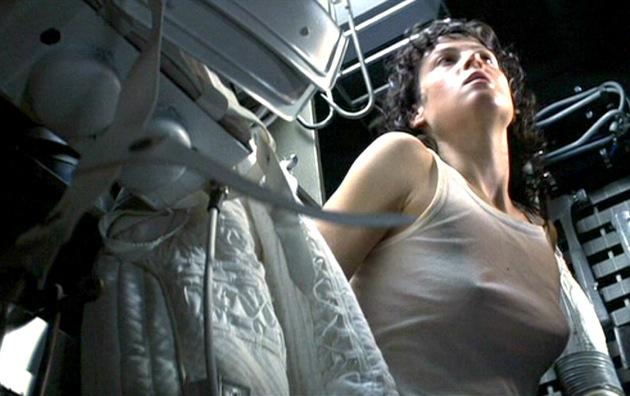
Alien remains a defining sci-fi outing from Ridley Scott – perhaps not as famed as Blade Runner, but certainly a reshaping of the genre overall. It not only set up a franchise for Fox which has endured ever since, but also gave us one of cinema’s most enduring pairings: the Alien, and Ellen Ripley. While I believe James Cameron went on to improve on the franchise with his sequel, this film should be looked at with a lot more passion and zeal than its bigger, badder follow-up receives, at least for it’s impact on cinema as a whole. Alien is a scary, well produced science fiction thriller, and still remains as effective today as it did upon initial release.

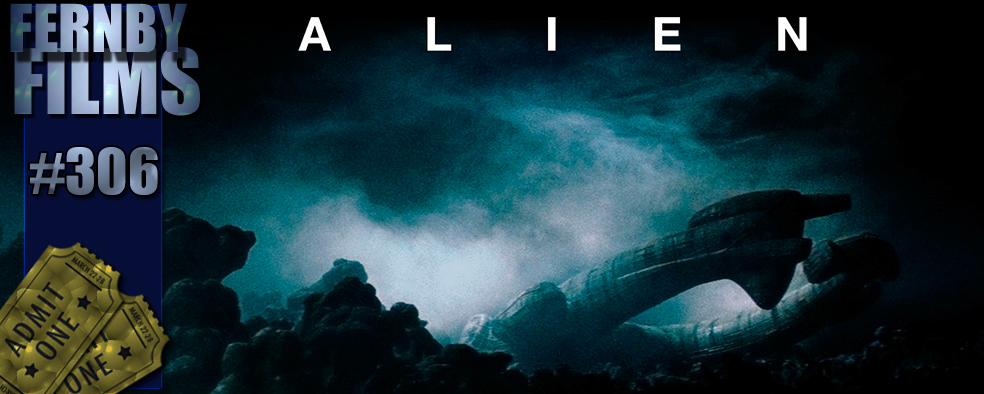
Terrific review Rodney. There's so much to enjoy about Alien – you've touched on many of the things I discuss. One thing that has always prevailed for me is just how scary the film is. Scott's gritty realism and use of off-screen space and sound creates this all-enveloping, claustrophobic atmosphere that I don't think has been recreated by anyone as well. James Cameron's brilliant sequel notwithstanding – that film was a little different of course.
And like you say – Ripley and the Alien are two wonderful characters. We had not seen a Ripley-like female role before 1979, likewise, we had never seen a monster as terrifying as H.R. Giger's creation.
Thanks man, this truly is one of the greats in science fiction. The fact it unleashed an entire franchise is just a happy accident! Glad you enjoyed it!